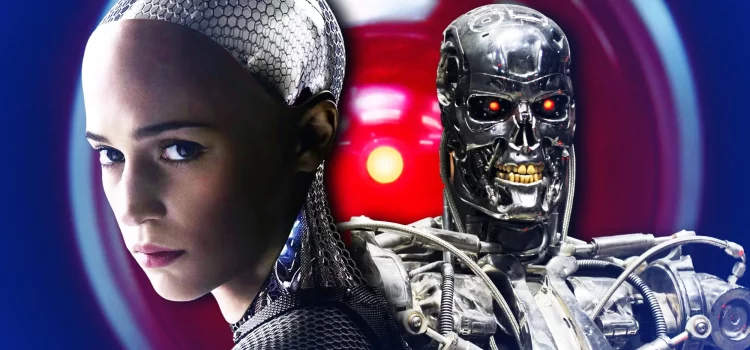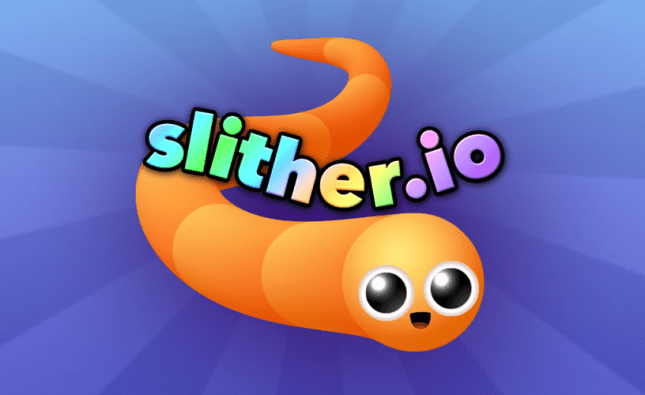
Introduction
Artificial intelligence (AI) is changing many industries, and the film industry is no exception. Over the past few years, AI has started to play a bigger role in how movies are made, marketed, and watched. From helping with scriptwriting to creating visual effects, AI is changing how filmmakers work. In this article, we will look at how AI is being used in Hollywood, what it means for the future of films, and what challenges it might bring.
The Rise of AI in Film

AI, or artificial intelligence, has been growing rapidly in many industries, and film is no different. Over the past few years, AI has started playing a bigger role in how movies are made. From helping create special effects to analyzing scripts, AI is changing how filmmakers approach their work. With technology improving every year, AI is becoming a powerful tool for filmmakers to use in different parts of the filmmaking process.
AI’s Role in Film Production
AI is starting to show up in many parts of film production. Filmmakers use AI to save time and money, and even to make their films better. For example, AI can help analyze scripts to predict how well a movie might do at the box office. AI can also help with things like casting decisions by looking at past roles and performances to suggest the best actor for a role.
AI in Scriptwriting
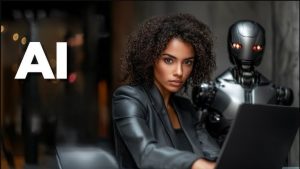
One of the most exciting ways AI is being used in film is in scriptwriting. AI can now generate ideas for stories, create dialogue, and even write full scripts. While AI-written scripts are not yet as emotionally rich as those written by humans, they are helping writers come up with new ideas and improve their stories. Some believe that AI will work alongside human writers to create better stories that combine data with human emotion and creativity.
AI in Editing and Post-Production
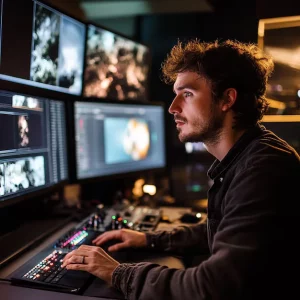
AI is also changing how films are edited. AI can go through hours of footage and pick the best shots based on things like lighting and pacing. This helps speed up the editing process, allowing filmmakers to focus more on creativity. AI also helps with color correction, sound design, and creating CGI (computer-generated images). One technology that has caught attention is deepfake, which uses AI to create realistic digital versions of people’s faces and voices. This technology can be used for digital performances, but it also raises concerns about privacy and consent.
AI in Visual Effects (VFX)
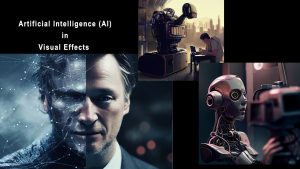
Visual effects (VFX) have always been a big part of Hollywood movies, and AI is making them even better. AI can now create realistic effects, such as lifelike explosions or water simulations. It can also speed up the process of rendering these effects, which used to take a lot of time. AI is also improving animation by making the process faster and more efficient. This allows filmmakers to create high-quality animated films without spending as much time or money.
AI in Marketing and Audience Engagement
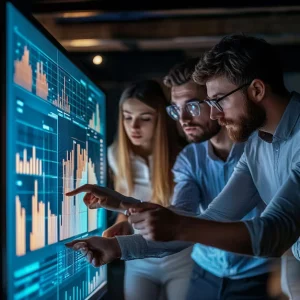
AI is not just changing how films are made; it is also changing how they are marketed. AI can help filmmakers understand what kinds of movies will appeal to certain audiences by analyzing data from social media and streaming platforms. This helps filmmakers create more effective marketing campaigns that reach the right people. AI also plays a role in content recommendations on streaming platforms. By analyzing viewer preferences, AI suggests movies and TV shows that users might enjoy, keeping them engaged and encouraging them to watch more.
Ethical and Artistic Concerns of AI in Film
While AI has many benefits, there are also concerns about its impact on the film industry. One worry is that AI could replace jobs in filmmaking, especially in areas like writing, editing, and visual effects. Another concern is that AI cannot replicate the emotional depth that human filmmakers bring to their work. Critics argue that too much reliance on AI could lead to films that lack heart and soul. Additionally, the rise of technologies like deepfakes raises ethical questions about actors’ likenesses and consent.
AI in Casting Decisions
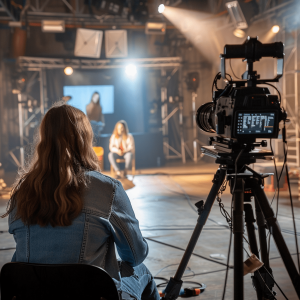
Casting is a critical part of making a movie, as the right actors can bring a story to life. AI is now being used to help make casting decisions. AI tools can analyze an actor’s past performances and suggest the best person for a role based on factors like acting style, audience popularity, and even how well an actor has performed in similar roles. This helps casting directors make more informed decisions quickly. While AI cannot fully replace human intuition in choosing the perfect actor, it can assist by offering valuable insights that improve the casting process.
AI in Film Distribution
Once a movie is made, getting it to the audience is the next big challenge. AI is starting to play a role in film distribution. Streaming platforms like Netflix and Amazon Prime use AI to suggest movies to viewers based on their past watching habits. AI can also help film distributors figure out which regions or countries a movie is likely to do well in. By analyzing audience preferences and market trends, AI can recommend the best times and platforms for releasing a movie, helping filmmakers reach the right audience at the right time.
AI in Sound Design
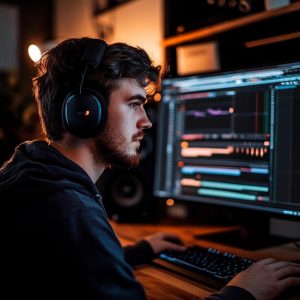
Sound is an essential part of any movie. Whether it’s a background score or sound effects, audio adds a lot to the atmosphere of a film. AI is now helping sound designers create the perfect audio experience. AI can quickly analyze scenes and suggest sound effects or background music that will match the tone and feel of a scene. It can also help with noise reduction, ensuring the audio quality is clear and crisp. By automating parts of the sound design process, AI allows sound designers to focus more on creativity and fine-tuning the audio to match the director’s vision.
AI in Film Criticism and Reviews
AI is also starting to play a role in film criticism. Some AI systems can analyze movies and generate reviews based on factors like plot structure, pacing, and acting quality. While AI reviews are not as personal or emotional as human critics, they can offer a helpful, data-driven perspective. These AI-generated reviews are often used by streaming services to provide quick summaries of films and help users decide what to watch. As AI continues to improve, it may be able to offer more in-depth analysis, providing a new way for audiences to understand films.
AI in Personalizing Viewing Experiences
AI is also changing how viewers experience films. Streaming services like Netflix use AI to recommend movies and shows based on what you’ve watched before. This helps viewers discover new content that they might not have found otherwise. In the future, AI could make the viewing experience even more personal. For example, AI could adjust the way a movie is presented based on the viewer’s preferences, like changing the camera angles or music to suit a person’s mood. This could lead to a more immersive and customized movie-watching experience.
AI’s Impact on Independent Filmmakers
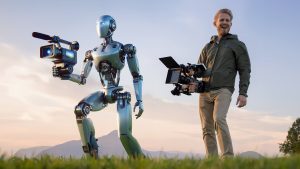
For independent filmmakers, AI provides new opportunities to create high-quality films on smaller budgets. In the past, filmmakers needed large teams and expensive equipment to make films with advanced visual effects or complex editing. Now, AI-powered tools can help small production teams create impressive effects and streamline the editing process. This opens up new possibilities for independent filmmakers, allowing them to compete with big-budget studios. However, the challenge remains to balance the benefits of AI with maintaining the artistic, personal touch that is often seen in independent films.
Challenges of AI in Film
While AI has many benefits, there are also challenges. One major concern is that AI could replace jobs that are currently done by humans, such as writing, editing, and visual effects work. Many people worry that AI can’t fully capture the emotion and creativity that human filmmakers bring to their work. Additionally, AI tools like deepfake technology raise ethical issues about privacy and consent, especially when it comes to using an actor’s likeness in films without their permission.
The Future of AI in Hollywood
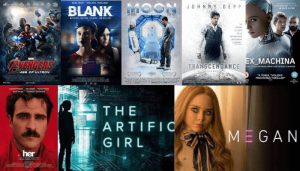
Looking ahead, it is clear that AI will play an even bigger role in Hollywood. As technology improves, filmmakers will likely use AI to help with every part of making a movie, from writing to distribution. However, it is important to strike a balance between using AI and keeping human creativity at the center of filmmaking. AI will also continue to change how movies are watched. For example, virtual reality (VR) and augmented reality (AR) could be combined with AI to create new, interactive ways for audiences to experience stories.
Analysis Table: The Impact of AI on Different Parts of Filmmaking
| Area of Filmmaking | How AI Helps | Effect on Filmmaking |
|---|---|---|
| Scriptwriting | AI can create ideas, dialogue, and even full scripts. | Speeds up the writing process and sparks creativity. |
| Film Editing | AI helps choose the best shots and edit quickly. | Saves time on editing and lets filmmakers focus on creative work. |
| Visual Effects (VFX) | AI makes realistic simulations and animation. | Improves quality of VFX and speeds up production. |
| Casting | AI suggests the best actors based on past roles. | Makes casting decisions faster and more accurate. |
| Audience Engagement | AI analyzes data to help target the right audience. | Creates more effective marketing strategies. |
Comparative Table: Traditional Filmmaking vs. AI-Assisted Filmmaking
| Area | Traditional Filmmaking | AI-Assisted Filmmaking |
|---|---|---|
| Production Speed | Slow due to manual processes. | Faster because of AI automation. |
| Cost | High due to human labor and long production times. | Can be cheaper with less labor involved. |
| Creativity | Based on human skills and imagination. | Combines human creativity with AI-generated ideas. |
| Audience Targeting | Based on instincts and past experiences. | Data-driven, tailored to specific audiences. |
| Visual Effects Quality | Relies on human talent and time. | AI can create faster and more realistic effects. |
Conclusion
AI is already having a big impact on the film industry, and its influence will only grow in the coming years. While AI is helping filmmakers be more efficient and creative, it also raises important questions about jobs, ethics, and the future of storytelling. As AI continues to develop, Hollywood will need to find a way to balance technology with human creativity. The future of filmmaking may be a mix of both, where AI helps make movies better while keeping the human touch that makes films so special.








